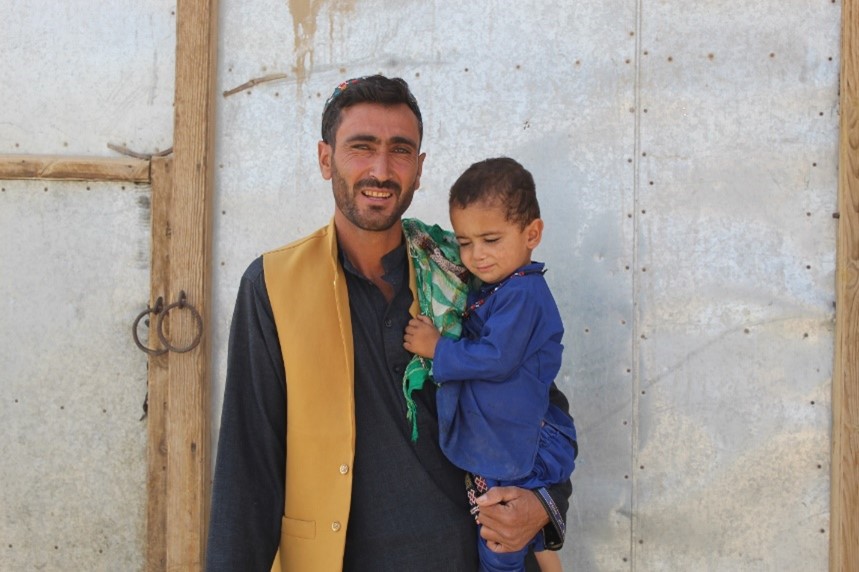ABADEI is a UNDP Afghanistan flagship programme that supports livelihoods and basic services, boosting local economies; builds or refurbishes community infrastructure, helps build disaster and climate resilience, and enhances bottom-up, inclusive community engagement and involvement.
Saving Money, Saving Lives
November 14, 2022
By Jan Mohammad Nabizada, SCA northeast ABADEI Communication Officer

“I never had the chance to go to school,” says Ebrahim. “I worked as a farmer alongside my father to support my family. However, as my family grew, I didn’t have enough money to feed them.”
Ebrahim is from the Mirshaikh Balocha community region in the northeast of Afghanistan, and his situation is not unique. Like many others in this remote agricultural region, he struggles to get by. Due to decades of civil war, the local infrastructure here – roads, schools and hospitals – are in dire need of repair.
After August 2021, when the fighting stopped, UNDP, with its partner on the ground, Swedish Committee for Afghanistan (SCA), was the first organization to support these communities with interventions designed to boost livelihoods and basic services through its ABADEI programme.
Among these interventions was the savings programme, which aimed to provide an alternative to the collapsed Afghan banking sector. A year on from the fall of the government, six out of ten microfinance institutions in the country have closed due to a lack of liquidity in the markets. This has left vulnerable communities with nowhere to turn for loans to help them through difficult times. Savings groups provide a solution to this by pooling community resources to create a fund which can then be lent out to members of the community when they need it most.
Ten saving groups were created in the Aliabad district of Kunduz. Training sessions were organised on subjects like savings, crediting operations, and lending. Each savings group had 20 members, each person contributing AFN 100 (1.15 USD) monthly. After conducting an assessment, SCA then provided AFN 28,800 (about US$ 320) to each saving group as “seed capital” to increase and strengthen their financial base.
Six months into participating in the savings group, Ebrahim found himself in desperate need for money. “My son fell ill. He had severe diarrhea,” he says. “We first tried traditional medicine, but it didn’t work.” He adds, “Late one night, my son’s condition rapidly deteriorated. I decided that I had to take him to the regional hospital in Kunduz. But it was very far away, and I had no money to make the journey.”
“Then I realized that I had savings with my community. I called the savings committee administrators to ask for a loan. They immediately agreed, and I was able to take my child to the hospital in time. Thank God, he is healthy now. The savings group was like a guardian angel for my child.”
Ebrahim remains more enthusiastic than ever about the savings groups under ABADEI. Currently, 1,200 household heads (50% of these female) are active in savings groups within the region. Word has travelled, and many other communities have asked to join the scheme.

Saving groups and access to loans in times of crisis alleviate financial vulnerability and food insecurity. It also serves as a bridge toward social cohesion, creating more robust and caring communities. Finally, saving groups offer a valuable opportunity to improve financial literacy, providing the foundation for entrepreneurship and innovative local economic activities. This year, with partners, UNDP Afghanistan aims to support more than 1,000 community-based groups, with at least 35% of them women. More than 700 saving groups have been helped so far.
ABADEI is a UNDP Afghanistan flagship programme that supports livelihoods and basic services, boosting local economies; builds or refurbishes community infrastructure, helps build disaster and climate resilience, and enhances bottom-up, inclusive community engagement and involvement.
This project was realized through a generous donation from the Government of Japan, a long-term partner to UNDP Afghanistan that continued through the COVID-19 pandemic and the sudden changes in August 2021. UNDP Afghanistan and The Government of Japan share the vision of the centrality of human security and the humanitarian-development-peace nexus approach in responding to and recovering from crisis in Afghanistan.

 Locations
Locations



